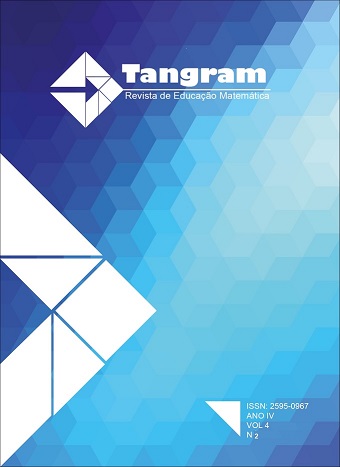Aprender a enseñar matemáticas en la formación inicial de profesores de educación especial
DOI:
https://doi.org/10.30612/tangram.v4i4.15417Keywords:
Formación inicial de profesores. Educación especial. Educación matemáticaAbstract
En este trabajo se presenta el diseño de una asignatura para el plan formativo de profesores de educación especial. Comenzamos describiendo brevemente los fundamentos teóricos qué se centran prácticas de enseñanza efectivas y el Análisis Didáctico desde la perspectiva del Grupo de Investigación FQM-193. Posteriormente, explicitamos la estructura de la actividad curricular, describiendo y ejemplificando las actividades realizadas. Finalmente, reseñamos las conjeturas que subyacen en la propuesta.
Downloads
References
Brownell, M. T., Steinbrecher, T., Kimerling, J., Park, Y., Bae, J. y Benedict, A. (2014). Dimensions of teacher quality in general and special education. En P. T. Sindelar, E. D. McCray, M. T. Brownell y B. Lingnugaris/Kraft (Eds.), Handbook of research on special education teacher preparation (pp. 423–444).
Castro-Rodríguez, E. (2015). Significados de las fracciones en las matemáticas escolares y formación inicial de maestros (Tesis doctoral). Universidad de Granada, España.
Greer, D. L. y Meyen, E. L. (2009). Special education teacher education: A perspective on content knowledge. Learning Disabilities Research & Practice, 24(4), 196–203.
Griffin, C. C., van Garderen, D. y Ulrich, T. G. (2014). Teacher preparation. Mathematics. En P. T. Sindelar, E. D. McCray, M. T. Brownell y B. Lignugaris/Kraft (Eds.), Handbook of research on special education teacher preparation (pp. 271–287). Nueva York, NY: Routledge.
Hill, H. C., Blunk, M. L., Charalambous, C. Y., Lewis, J. M., Phelps, G. C., Sleep, L. y Ball, D. L. (2008). Mathematical knowledge for teaching and the mathematical quality of instruction: An exploratory study. Cognition and Instruction, 26(4), 430–511.
Hill, H. C., Rowan, B. y Ball, D. L. (2005). Effects of teachers’ mathematical knowledge for teaching on student achievement. American Educational Research Journal, 42(2), 371–406.
López-Mojica, J. M. (2016). Formación matemática de los docentes de educación especial. En J. Cuevas y A. I. Andrade (Eds.), Abordajes metodológicos para problemas educativos emergente (pp. 173–184). San Luis de Potosí, México: Centro de Estudios Jurídicos y Sociales Mispat y Universidad Autónoma de San Luis de Potosí.
Lupiáñez, J. L. (2013). Análisis didáctico. La planificación del aprendizaje desde una perspectiva curricular. En L. Rico, J. L. Lupiáñez y M. Molina (Eds.), Análisis didáctico en educación matemática (pp. 81–102). Madrid, España: Comares.
Martínez, M. V., Rojas, F., Ulloa, R., Chandía, E., Ortiz, A. y Perdomo-Díaz, J. (2019). Creencias y conocimiento matemático escolar al comienzo de la formación inicial docente en estudiantes de Pedagogía General Básica. Pensamiento Educativo, 56(2), 1–19.
Ministerio de Educación. (2012). Bases curriculares Educación Básica. Santiago, Chile: Unidad de Curriculum y Evaluación.
Ministerio de Educación. (2014). Estándares orientadores para carreras de Educación Especial. Santiago, Chile: Autor.
Montague, M. y Jitendra, A. K. (2012). Research-based mathematics instruction for students with learning disabilities. En H. Forgasz y R. Rivera (Eds.), Towards equity in mathematics education: Gender, culture, and diversity (pp. 481–502). Cham, Suiza: Springer.
Mullis, I. V. S. y Martin, M. O. (2013). TIMSS 2015 assessment frameworks. Chestnut Hill, MA: IEA.
NCTM. (2014). Principles to actions: Ensuring mathematical success for all. Reston, VA: Autor.
Park, Y., Kiely, M. T., Brownell, M. T. y Benedict, A. (2019). Relationships among especial education teachers’ knowledge, instructional practice and students’ performance in reading fluency. Learning Disabilities Research & Practice, 34(2), 85–96.
Rico, L. (2013). El método del análisis didáctico. UNIÓN, 33, 11–27.
Rico, L. y Fernández-Cano, A. (2013). Análisis didáctico y metodología de investigación. En L. Rico, J. L. Lupiáñez y M. Molina (Eds.), Análisis didáctico en educación matemática. (pp. 1–22). Granada, España: Comares.
Rico, L., Lupiáñez, J. L. y Molina, M. (2013). Análisis didáctico en educación matemática. Granada, España: Comares.
UGCI. (2019). Plan de Estudios. Licenciatura en educación y pedagogía en educación especial, especialidad en comunicación y lenguaje, o en educación de personas sordas, o en aprendizaje (Documento de Trabajo UMCE). Santiago, Chile.
Vicerrectoría Académica. (2016). Modelo educativo UMCE. Santiago, Chile: UMCE.
Downloads
Published
How to Cite
Issue
Section
License
Copyright (c) 2021 TANGRAM - Revista de Educação Matemática

This work is licensed under a Creative Commons Attribution-NonCommercial-ShareAlike 3.0 Unported License.
Authors must accept the publication rules when submitting the journal, as well as agree to the following terms:
(a) The Editorial Board reserves the right to make changes to the Portuguese language in the originals to maintain the cultured standard of the language, while respecting the style of the authors.
(b) Authors retain the copyright and grant the journal the right to first publication, with the work simultaneously licensed under the Attribution-NonCommercial-ShareAlike 3.0 Brazil (CC BY-NC-SA 3.0 BR) that allows: Share - copy and redistribute the material in any medium or format and Adapt - remix, transform, and create from the material. CC BY-NC-SA 3.0 BR considers the following terms:
- Attribution - You must give the appropriate credit, provide a link to the license and indicate whether changes have been made. You must do so under any reasonable circumstances, but in no way that would suggest that the licensor supports you or your use.
- NonCommercial - You may not use the material for commercial purposes.
- Sharing - If you remix, transform, or create from material, you must distribute your contributions under the same license as the original.
- No additional restrictions - You may not apply legal terms or technological measures that legally restrict others from doing anything that the license permits.
(c) After publication, authors are allowed and encouraged to publish and distribute their work online - in institutional repositories, personal page, social network or other scientific dissemination sites, as long as the publication is not for commercial purposes.






